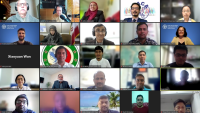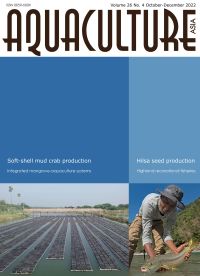On 28-29 November FAO and NACA collaborated on a virtual workshop to develop a regional strategy for aquatic organism health, using a progressive management pathway for improving aquaculture biosecurity. The workshop was held under the auspices of the project “Responsible use of fisheries and aquaculture resources for sustainable development component 3: Biosecurity and health management”. The workshop involved 31 experts from 16 countries, including national focal points, FAO and NACA. The objectives of the workshop were to: Present and analyse country responses to a self-assessment survey on biosecurity and health management capacity and performance; to provide guuidance to country participants on conducting a SWOT analysis; and to prepare a detailed plan for Phase II of the initiative.
As a follow on from the September FAO/NACA workshop on aquaculture transformation, FAO and NACA convened a high-level meeting to discuss the issue and the outcome of the previous consultation with policy makers. The meeting was held virtually from 22-23 November and was attended by 79 senior officials from 25 countries and international organisations, with observers from industry and international NGOs. Specific objectives of the high-level meeting were to: Engage senior policy makers and business leaders in the process of defining regional targets, action areas and initiatives for aquaculture transformation in the region by 2030, identify strategies and mechanisms to stimulate innovation and investment, and to recommend follow up actions and commitments.
With the implementation of the new aquatic animal disease reporting in the Asia Pacific region from January 2021, and in lieu of the published QAAD Reports (last issue published was 4th quarter of 2020), NACA is publishing reported aquatic animal diseases submitted by countries in the Asia-Pacific region. This report covers the second quarter of 2022 and the original and updated reports can be accessed at the QAAD page.
NACA welcomed five delegates from India on an aquaculture training and exposure visit from 31 October to 4 November. The visit began with a discussion at the NACA Secretariat on Thai mariculture, the recently established International Artemia Aquaculture Consortium, and better management practices concerning hatchery production and use of live feeds. The delegates left Bangkok the next day to visit seabass cage and pond culture and a shrimp nursery in the Chachengsao area and Bangprakong River. The following day they travelled to the Rayong Coastal Aquaculture Center and visited local farm sites before overnighting in Chantaburi. On the final day they visited the Kung Krabae Bay Royal Development Study Center and mangrove walk; and a freshwater fish farm to observe intensive carp and pangasius culture.
In this issue:
Sustainable livelihood model for coastal families through seabass fingerling production: A success story; A pilot of integrated mangrove-aquaculture as a nature-based solution to mitigate climate change in West Bengal, India; Recreational fisheries in Uttarakhand; Soft-shell mud crab production for export in Purba Medinipur, West Bengal, India; Conducting artificial fertilisation, hatching and spawn development of Indian shad, Tenualosa ilisha: Pathfinding hilsa domestication; NACA Newsletter.

